List of Indian flags
This is a list of flags used in India. For more information about the national flag, visit the article Flag of India.
National flag
| Flag | Date | Use | Description |
 | 1947–present | National flag of India | A horizontal tricolour of saffron at the top, white in the middle, and green at the bottom. In the centre is a navy blue wheel with twenty-four spokes, known as the Ashoka Chakra. The world's largest and tallest Indian tricolour was unfurled at Town Park in Faridabad.The flag weighs 48 kilograms and has a 96 feet by 64 feet dimension. It was hoisted at a height of 250 feet (75 meters), making it the largest and the highest hoisted Indian flag in the world. |
Governmental flag
Ensigns
| Flag | Date | Use | Description |
 | | Civil ensign | A Red Ensign with the flag of India in the canton. |
 | | State ensign | A Blue Ensign with the flag of India in the canton, and a yellow anchor horizontally in the fly. |
Military flags
| Flag | Date | Use | Description |
 | | Flag of the Indian Army | A red field with the flag of India in the canton, and the Army badge in the fly |
 | | Ensign of the Indian Navy | It is built up of the Indian National Flag, a Vertical and a Horizontal Red Stripe, the Indian State Emblem in golden yellow colour on a white background. |
 | | Flag of the Indian Air Force | A sky-blue ensign with the flag of India in the canton, and the Air Force roundel in the fly |
 | | Ensign of the Indian Coast Guard | A Blue Ensign with the flag of India in the canton, and the Coast Guard badge in the fly |
Naval flags
(Indian Army Flags of entitled officers displayed on the Official Car bonnets are available on this link http://www.bharat-rakshak.com/LAND-FORCES/index.php?option=com_content&view=article&id=400 )
| Flag | Date | Use | Description |
 | | Admiral of the Fleet (rank has never been used) | |
 | | Admiral (Chief of Naval Staff) | |
 | | Vice Admiral | |
 | | Rear Admiral | |
 | | Commodore | |
States and Union territorial flags
De jure state flags
The states and Union territories do not have official flags, except for Jammu and Kashmir.[1]
| Flag | Date | Use | Description |
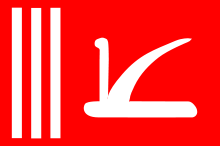 Jammu and Kashmir Jammu and Kashmir | 1972–present | Flag of Jammu and Kashmir | The flag is red to symbolize labour, with three white vertical stripes in the hoist (which do not run the whole height of the flag). The stripes stand for the three divisions of the region namely; (Jammu, Kashmir, and Ladakh). On the right side of the flag is a white plough with the handle facing the stripes. The ratio of the flag to its width is 3:2. |
De facto state flags
| Flag | Date | Use | Description |
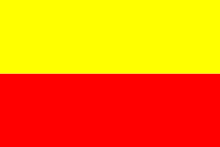 Karnataka Karnataka | 1965–present | Kannada flag, used as a de facto state flag in Karnataka[2] | Two horizontal strips of equal length and breadth with yellow strip on the top and red strip at the bottom. |
.svg.png) Sikkim Sikkim | 1967-1975 | Flag of Sikkim, used as a flag when Sikkim was an independent kingdom before its annexation to India | Buddhist khorlo prayer wheel with the gankyil in the center, on a field of white with a red border. |
The Kannada flag is not officially or unofficially the Karnataka flag. It is actually the flag of a political party, Kannada Paksha, which was formed in 1965 by M. Ramamurthy. The flag is now used for the Kannada Rajyothsava and Kannada-oriented celebrations. The yellow and red colours in the flag stand for arshina (turmeric) and kumkuma (vermilion), respectively.[3] The yellow and red colours signify Peace and Courage respectively.
The Sikkim flag lost its official status when Sikkim became a part of India after the Sikkimese monarchy referendum, 1975.
Historical
Pre-colonial states
| Flag | Date | Use | Description |
.svg.png) | 1526–1857 | Flag of Mughal Empire | A dark green flag with a rising sun, partially eclipsed by a lion. |
 | 1674–1818 | Flag of Maratha Empire (Bhagwa Dhwaj)[4] | A saffron-coloured swallowtail flag. |
 | 1707–1849 | Flag of Sikh Confederacy and then Sikh Empire | The last state in India to be subjugated by the British Empire. The political flag is closely based on the Nishan Sahib, the Sikh religious flag. |
British India
| Flag | Date | Use | Description |
 | 1858–1947 | The official state flag of the Indian Empire for use on land | The flag of the United Kingdom. |
.svg.png) | c. 1885–1947 | Flag of the Governor-General of India | The Union Flag defaced with the insignia of the Order of the Star of India beneath the Imperial Crown of India. |
.svg.png) | 1947–1950 | Dark blue field emblazoned with the royal crest (a Tudor Crown surmounted by the lion of England, itself wearing the crown), beneath which was the word 'India' in gold majuscules. Similar to flags used by other Governors-General of Commonwealth realms. |
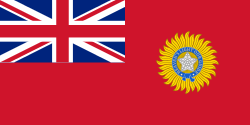 | c. 1880–1947 | Flag of British India An unofficial, or semi-official land flag used to represent British India in international events and associations | A Red Ensign with the Union Flag at the canton, and the Star of India displayed in the fly. |
 | 1863–1947 | 1879–1928 ensign of Her Majesty's Indian Marine / Royal Indian Marine
1928–1947 naval jack of the Royal Indian Marine / Royal Indian Navy | A Blue Ensign with the Union Flag at the canton, and the Star of India displayed in the fly. |
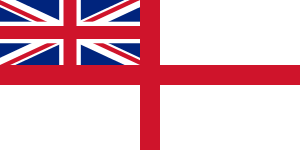 | 1928–1950 | Ensign of the Royal Indian Marine / Royal Indian Navy | The White Ensign of the Royal Navy. |
French India
| Flag | Date | Use | Description |
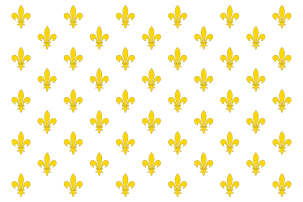 | 1667-1791, 1815-1830 | Flag of the Kingdom of France | The flag of the Kingdom of France. |
 | 1791–1815, 1830-1954 | | The flag of France. |
|
Portuguese India
| Flag | Date | Use | Description |
|
.svg.png) | 1495–1521 | Flag of the Kingdom of Portugal. | |
.svg.png) | 1521–1578 | Flag of the Kingdom of Portugal. | |
.svg.png) | 1578–1640 | Flag of the Kingdom of Portugal. | |
.svg.png) | 1616–1640 | Putative flag of the Kingdom of Portugal. | |
.svg.png) | 1640–1667 | Flag of the Kingdom of Portugal. | |
.svg.png) | 1667–1706 | Flag of the Kingdom of Portugal. | |
.svg.png) | 1706 - 1750 1826 - 1830 | Flag of the Kingdom of Portugal. | |
 | 1750–1816 | Flag of the Kingdom of Portugal. | |
 | 1816–1826 | Flag of the Kingdom of Portugal. | |
.svg.png) | 1830–1910 | Flag of the Kingdom of Portugal. | Vertical bicolour blue-white. Proportion of the fields: 1:1. |
 | 1911-1961 | The flag of Portugal. The final state flag of Portuguese India. | Used from the declaration of the Republic of Portugal in 1910. |
Flags used by the Indian independence movement
| Flag | Date | Use | Description |
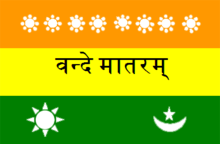 | 1906 | Calcutta Flag | Three horizontal bands of equal width with the top being orange, the centre yellow, and the bottom green. It had eight half-opened lotus flowers on the top stripe, and a picture of the sun and a crescent moon on the bottom stripe. वन्दे मातरम् (Vande Mātaram) was inscribed in the centre in Devanagari. |
 | 1907 | Early Indian nationalist flags |
 | 1907 | |
 | 1917 | Flag of the Home Rule Movement | Five red and four green horizontal stripes
On the upper left quadrant was the Union Jack, which signified the Dominion status that the movement sought to achieve. A crescent and a star, both in white, are set in top fly. Seven white stars are arranged as in the Saptarishi constellation (the constellation Ursa Major), which is sacred to Hindus. |
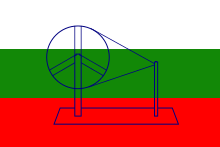 | 1921 | Gandhi's flag, introduced at the Indian National Congress meeting in 1921 |
 | 1923–1947 | The Swaraj Flag, officially adopted by the Congress in 1931 |
 | 1942–1945 | Flag of Provisional Government of Free India | Three horizontal strips of saffron, white, and green, with a springing tiger in the center
Although this symbolized the armed resistance of the Azad Hind Movement lead by Netaji Subhas Chandra Bose (as opposed to Gandhian pacifism), the 1931 flag of the Indian National Congress was used when the Indian National Army hoisted its flag in Moirang, Manipur. Both flags were used interchangeably. |
See also
Notes
References
|
|---|
| | | | State-related | | Mobile military | |
|---|
| | Mobile civilian | |
|---|
|
|---|
| | Other entities | |
|---|
| | By design | |
|---|
| | By nations | |
|---|
| | By continent | |
|---|
| Names in italics indicate non-sovereign (dependent) territories and/or former countries. |
|












 Jammu and Kashmir
Jammu and Kashmir  Karnataka
Karnataka.svg.png) Sikkim
Sikkim.svg.png)


.svg.png)
.svg.png)





.svg.png)
.svg.png)
.svg.png)
.svg.png)
.svg.png)
.svg.png)
.svg.png)


.svg.png)







